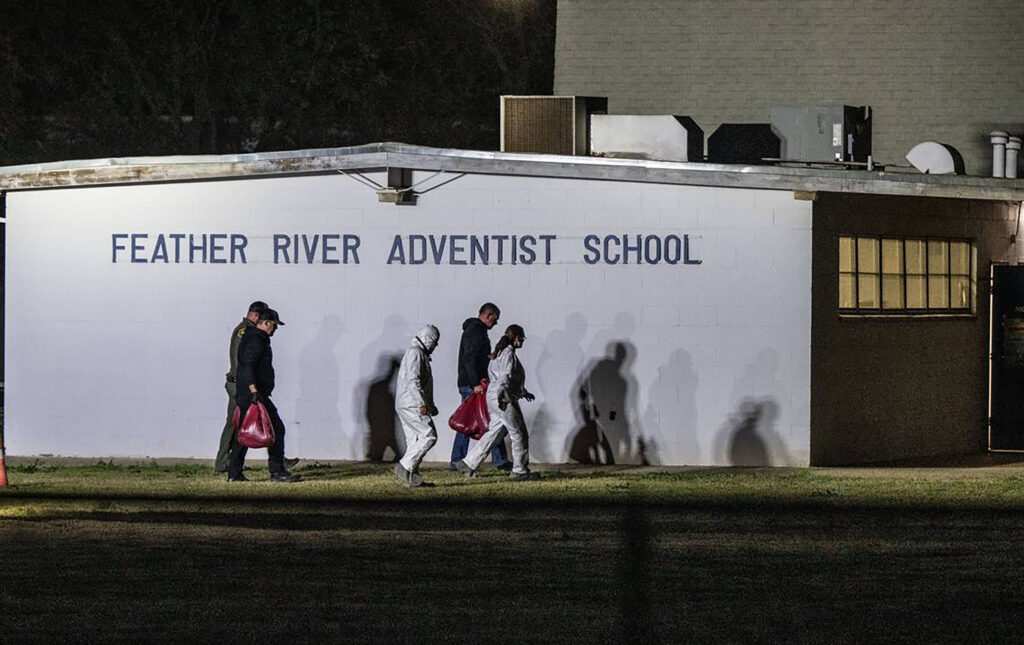Before Glenn Litton shot two kindergartners, destroying a carefree lunch recess at Feather River Adventist School in Northern California, he sent a letter.
The missive, sent to distant acquaintances, included Litton’s manifesto in which he declared himself tasked with carrying out “child executions” as part of an international group that Butte County Sheriff Kory Honea and the FBI have said is nonexistent. He even scheduled an email with the same manifesto to others that would be sent after his Dec. 4 shooting at the parochial school, during which Litton also shot and killed himself, Honea said.
“It was a terrorist attack,” Honea said in an interview. “It was a horrific crime.”

On Tuesday, the Sheriff’s Office announced the arrest of a man accused of selling Litton the handgun used to severely injure the two boys, ages 5 and 6.
Between the gun arrest and a recent interview at the Sheriff’s Office headquarters, law enforcement have provided the fullest picture yet of the shooting — and of Litton’s history, in the decades before it and hours immediately leading up to it.
A school targeted — or more than one?
Terror seized the tight-knit religious Adventist community after 5-year-old Elias Wolford and 6-year-old Roman Mendez suffered critical wounds in the shooting. The Feather River Adventist School is just one of several campuses connected to Adventist churches across Butte County.
Litton, using the name Michael Sanders, had scheduled an appointment with Feather River Adventist School principal under the ruse of enrolling his nonexistent grandson.
It was a ruse Honea said the shooter had used before.
The sheriff confirmed Litton also went in June to an Adventist school in Chico under the pretense of enrolling a child. Litton also targeted another Adventist school in Red Bluff, about 70 miles northwest of Oroville, by planning a similar meeting for the day after the school shooting at Feather River Adventist.
Across three schools he visited, Litton asked questions that appeared to show he was surveilling the school, Honea said.
The sheriff speculated Litton had a narcissistic personality, shown by him self-appointing himself as a military leader in the nonexistent national group.
‘A good heart,’ but a troubled history
Litton’s mental health appeared to play a key role in his motivation to open fire at Feather River Adventist, Honea has said.
In the manifesto he sent to his friends, Litton proclaimed himself a lieutenant in the so-called International Alliance, tasked with carrying out “countermeasure in necessitated response to Americas involvement with Genocide and Oppression of Palestinians along with attacks towards Yemen.”
“It appears he pulled information from various sources and it all came together in his mind to form a reality that perhaps is false or different from ours,” Honea said at a Dec. 5 news conference.
Honea and deputies in the recent interview revealed that Litton had scheduled the emails and sent the mailed letters, the contents of which Honea first shared at the news conference without disclosing the exact medium used.
Honea added that, weeks after the shooting, he has not been able to determine what diagnosis Litton received for his mental health problems.
The 56-year-old has a criminal history dating back to age 16 and received inpatient mental health treatment as a juvenile into adulthood, according to court documents. Butte County District Attorney Mike Ramsey said Litton faced charges of thefts and traffic violations as a teen. As an adult, he served time in prison as an adult for forgery and theft; in one Butte County case, Litton stole IDs for food, rent and entertainment.
Before federal authorities arrested Litton in 2015 for aggravated identity theft, his older sister said she tried several times to get him help for his substance abuse issues.
But he was always denied the service because of a “mental health diagnosis,” according to a letter written by Litton’s sister.
“Glenn has a good heart but has always struggled with an addiction which has negatively impacted his decisions,” Litton’s sister wrote in a letter to a judge for a federal case her brother faced.
The sister did not respond to a request for comment.
Shooter bought a convicted murderer’s identity, he says
Federal authorities caught up to Litton after he sought passports under two aliases in 2014 and again in 2015.
In the first case, Litton filed a passport application in Sacramento under the name Michael Anthony Nolen, a man who Litton claimed lived in Tennessee and was born in 1972, according to the indictment. (Litton was born in Chico in 1968.)
In 2015, he filed an application in Carson City, Nevada, under the name Arthur Gene Lane, a man convicted of murder in Sacramento County. Lane filmed himself in 2001 wrapping a noose around his girlfriend’s neck and removing a chair under her, all while videotaping it.
Lane told authorities investigating Litton that he sold his personal information to Litton for $800, court papers say. Litton filed the passport application using a Nevada driver’s license, Social Security number, check and a Visa debit card in Lane’s name.
While awaiting his sentence, Litton enrolled in mental health services, court papers say. He pleaded guilty to an aggravated identity theft charge each in California and Nevada, said Siddhartha “Sid” Patel, the special agent in charge of the FBI Sacramento field office.
Litton was sentenced to two years and was released on supervised release in 2018. The plan, according to Litton’s sister, was to enroll in a truck driving school after his release.
“I can tell you Glenn realizes his wrong choices and frequently talks about how he plans to change his behavior in the future,” Litton’s sister wrote in the letter.
After his prison release, jail wasn’t far behind for Litton. He stole $1,000 from a CVS in Arizona, authorities said. He was arrested in South San Francisco in connection to an unrelated case and was transferred to San Bernardino County for a pending burglary charge.
Litton was released from custody in San Bernardino after a Humphrey hearing, according to court records, which is conducted to determine whether an inmate has enough money to post bail.
‘Everything else stopped’
It was at 1:08 p.m. Dec. 4 that a student called 911 to relay that a shooter had opened fire on Feather River Adventist, a small school on a 7-acre lot surrounded by lush orchards and lumbering cows.
The California Highway Patrol within two minutes arrived on the scene, with deputies not far behind.
In interviews, Butte County Sheriff’s Office Lt. Pat McNelis described how nearly everyone in the department – 83 deputies – jumped on investigating the case. Deputies handled the local investigation, tracing Litton’s movements, while the FBI intervened to reach global contacts as the specter of international terrorism hung over the incident, Honea said.
“Everything else stopped,” McNelis said. A fatal vehicle collision, in which a juvenile was arrested, diverted some deputies Dec. 9, though little else pulled resources away from the Feather River Adventist investigation.
Within 26 hours of the shooting, top Butte County Sheriff’s Office and FBI leaders compiled a full timeline of Litton’s movements leading up to the school shooting, as well as his extensive criminal history.
Deputies described the around-the-clock police work conducted by nearly the entire department after the Dec. 4 shooting to piece together Litton’s life and bring answers to the public.
Deputies first contacted Litton’s sister and learned she had driven him to take a Sacramento Greyhound bus to Chico and paid for him to stay two nights at the Haven Inn in Chico, Nov. 23 and Nov. 24, McNelis said.
Deputies fanned out across Chico and surrounding areas, pouring through countless hours of surveillance footage and cellphone records to piece together, step by step, Litton’s tracks.
Litton stayed at two different inns in Chico over eight days, reflecting his nomadic lifestyle, deputies said.
On Dec. 3 — one day before the shooting — Litton went to a Chico computer repair store and paid $20 in an attempt to have his device destroyed, McNelis said. That computer was recovered and the FBI helped to piece it back together, he said.
That night, Litton stayed overnight at a Denny’s near Motel 6 carrying a distinctive duffel bag, until about 4:08 a.m., according to surveillance video.
Deputies tracked him catching a Butte Regional Transit bus at the West Second and Salem streets stop, and knew from investigating a prior case that the company had surveillance cameras they could comb through, McNelis said.
While on the bus, they picked up his phone records, and saw he headed to Raley’s in Oroville. He walked off, carrying the duffel bag, and strolled along Montgomery and Myers streets, McNelis said.
He bought an energy drink at Raley’s and called for an Uber under yet another name — Mark Hansen — that took him to the Feather River Adventist School.
It was ultimately through good old-fashioned police work, combined with investigative tools from the digital age, that deputies assembled a detailed breakdown of Litton’s movements leading up to the shooting and his criminal background, Honea said.
Honea couldn’t recall anything similar happening throughout his three decades of service in local law enforcement.
“I had to make them go home,” Honea said of deputies working without sleep.
The breadth of information provided to residents came from a desire to help a grieving community learn answers and find who should be held accountable for the fear gripping the region, deputies said in the interview.
Elias’ grandmother said online Wednesday he regained some movement in his legs, which was welcome news after the 5-year-old couldn’t move his legs immediately after the shooting. Roman’s family, in an update to a crowdfunding website, said the 6-year-old was released from UC Davis Medical Center on Dec. 20 and is “doing amazing.”
Even so, the school will never be the same.
Teachers must grapple with the effects of trauma that manifest in diverse ways, requiring constant attention and adaptability, said Laurie Trujillo, a spokesperson for the Feather River Adventist School and the Northern California Conference of Seventh-day Adventists.
After Litton concluded the meeting with Feather River Adventist’s principal, he headed down a breezeway. Against a backdrop of a mural of flowers painted on a playground wall, he opened fire on Roman and Elias. Then, he turned the gun on himself.
“If that is not an attack of domestic terrorism, I am not sure what is,” Honea said.





